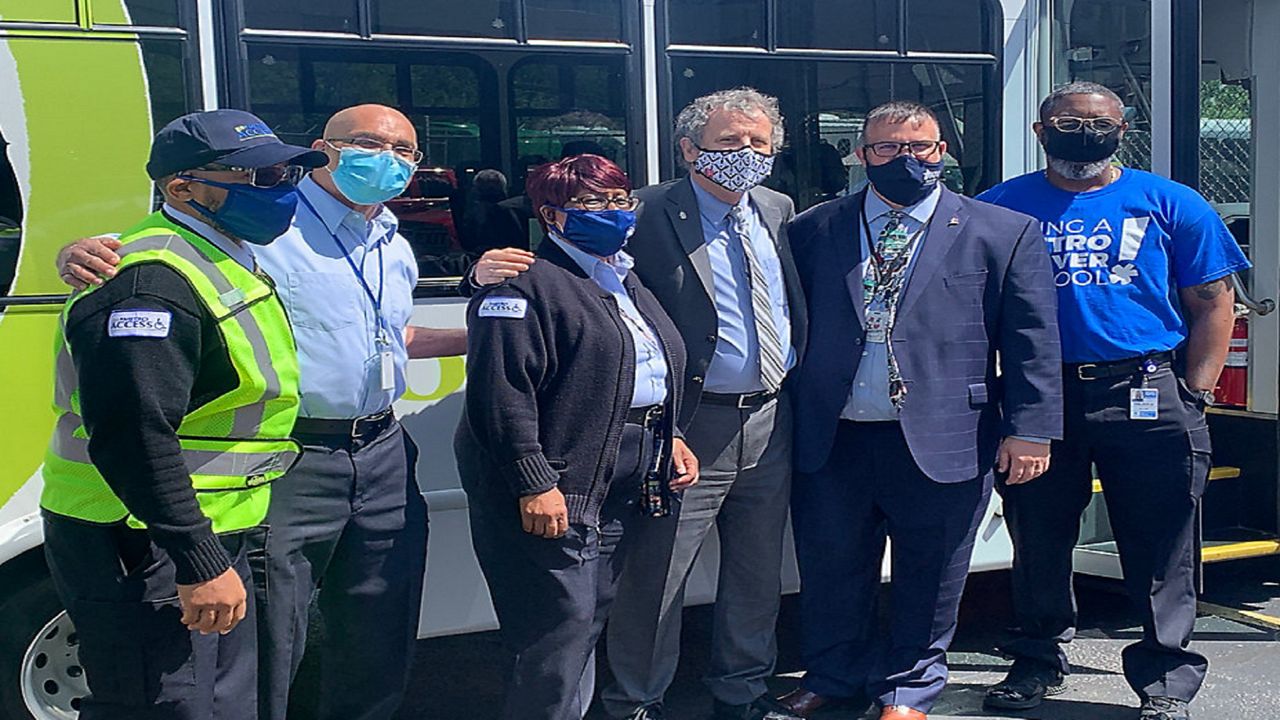May 6 Editor's Note: Story has been updated to include a response from the Ohio Secretary of State's Office and references to the bill have been updated to "voting laws" bill.
COLUMBUS, Ohio — Sen. Sherrod Brown voiced his concerns over a GOP-backed voting laws bill, taking aim at Ohio Republicans for wanting to “choose who the voters are," but the Ohio Secretary of State's office on Thursday refuted those claims.
Brown responded to an Ohio GOP effort to introduce an election reform bill, speaking Tuesday as he toured the Celeste Center mass vaccination site in Columbus.
Rep. Bill Seitz, R-Cincinnati, plans to propose a bill that would allow residents to request online absentee ballots, and move the request deadline to 10 days before the election instead of the Saturday before, according to the Associated Press. The bill would also permit the number of ballot drop-off sites to one for each county (three boxes per site) at its board of elections, and they would be available for just 10 days before Election Day.
Democrats, including Brown, have been pushing to increase the number of drop-off boxes across the state. The Ohio Democratic Party filed a lawsuit in August in the Franklin County Common Pleas Court, asking to allow local boards of elections to install more. The move came as a precautionary measure during the pandemic to avoid crowds at the polls and create more accessible locations for residents to cast their ballots.
But in October, the lawsuit was dropped because the state said it was too close to the election that installing the boxes would be nearly impossible.
Brown said Tuesday he agrees with progressive advocacy groups calling the Republican efforts repressive.
"When Republicans lost this year, instead of reassessing their positions, they decided they want to choose who the voters are. Rather than voters choosing the politicians, they want the politicians to choose the voters, and they know it's wrong. They know it's un-American to try to suppress the vote. That's what they're doing," Brown said.
Seitz said the bill isn’t meant to be a suppressive overhaul of voting protocols, but rather what he called a careful effort to incorporate changes sought by both Democrats and Republicans.
Many Republicans said the election was rigged — a claim also advanced by former President Donald Trump. Trump along with other lawmakers claimed poll workers threw out ballots and that polling locations weren't carefully being watched, but Democrats counter that those claims were disproved by election officials, calling it the "most secure" election in the nation's history.
Brown went on to call out other Ohio Republicans, including Secretary of State Frank LaRose.
"This is all fabricated so that Secretary LaRose and the speaker of the House and the president of the Senate can please Donald Trump in the new Donald Trump Republican Party. It's really as simple as that," Brown said. "I don't know if Governor DeWine is part of it, but I hope that he refuses to sign any one of these bills that suppresses the vote."
Refuting those claims, Ohio Secretary of State's press secretary Rob Nichols on Thursday provided the following statement to Spectrum News in response to Brown’s comments:
“Sherrod Brown conveniently omits the fact that when he was Ohio’s Secretary of State, Ohio had zero drop boxes, zero days of early voting, and to vote absentee, voters were required to provide proof of why they couldn’t vote in person on Election Day. And now he’s against reforms that would make it easier to register to vote, easier to vote absentee, and easier to vote on election day – all while maintaining Ohio’s high security standards. Ohioans would be better served if the Senator would use less hyper-partisan hyperbole and acted more like the statesman that voters deserve," Nichols wrote in a statement.
Ohio is among a growing list of states with Republicans backing similar voting measures.
According to the Brennan Center for Justice, out of 55 restrictive voting bills introduced in 24 states, 29 have passed at least one chamber. Texas, Georgia and Arizona have introduced the most number of bills aiming to strengthen voting restrictions.
The Associated Press contributed to this story.



